 |
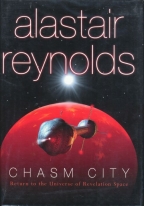 |
|
If you're lucky, you come out of the bookstore with a novel like Peter F. Hamilton's 'Fallen Dragon' as an impulse buy |
Alastair Reynolds'Chasm City' is an excellent choice for a first novel by author grab. |
|
|
|
You Can't Kill What's Already Dead
The Agony Column for September 20, 2002
Commentary by Rick Kleffel
Critics love to proclaim that one genre or another is dead. The horror genre in particular has been given more toe-tags than a big-city hospital could use between the Fourth of July and Labor day. The latest tag-and-bag essay is available from Locus Online at the following URL:
http://www.locusmag.com/2002/Commentary/Guran09_Standard.html
Guran has a lot of interesting things to say, and she says them well. Read it and enjoy it. It's the most entertaining headstone you're likely to encounter today.
On the other hand, if you hang around, you'll find that horror is very much alive. Still, there seems to be this persistent worry -- I encountered this worry as it related to science fiction at WorldCon as well -- that genres are "going away" or "dying", or experiencing some catastrophic decline in quality or quantity that means no more works in those genres will be published. The organizations dedicated to genres understandably view this development with alarm. Of course, that all depends on what you call a genre, and how you split your genres.
 |
 |
|
If you're lucky, you come out of the bookstore with a novel like Peter F. Hamilton's 'Fallen Dragon' as an impulse buy |
Alastair Reynolds'Chasm City' is an excellent choice for a first novel by author grab. |
Genre can be regarded as a marketing category, and that's usually what is meant. It controls how books are shelved, and it makes it a bit easier for readers to find books they like. Some people enter a bookstore and make a beeline for the science fiction section. Within it, they know they can find quality authors like Kim Stanley Robinson, Vernor Vinge, Greg Bear, Brian Herbert, and Kevin Anderson. Shelved with them they might pick up Alastair Reynolds, or Peter Hamilton. One week's book buying budget easily spent with reliable results. The same pattern could be repeated for the mystery section or the horror section. [To clarify any doubt in this matter, in 3 of 5 bookstores in Santa Cruz, there is a separate section for Horror. In one of the others, they are shelved with thrillers and mystery; in the other with general fiction. 3 of 3 bookstores tested in Victorville have separate sections for horror. All chain bookstores tested had separate sections for horror.]
Categorization makes choices easier. For a writer, or a publisher, however, genre can become an end in itself, not a means to an end. Sometimes (let's use Sturgeon's Law and say about 1-10% of the time), that results in a great novel. Other times, you'll get something enjoyable; and still other times (most of the time) you'll get something predictable with quality in the range between "never got the book actually opened" and "read it in the mindless fashion of a television viewer". Obviously if you're spending money on the damn things, you want to get past the cover. But sometimes, mindless TV reading is just fine.
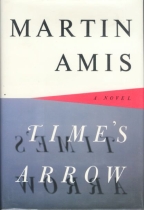 |
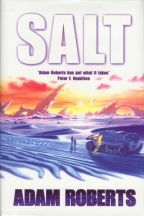 |
|
Martin Amis' 'Times Arrow' is the exception to the rule that literary authors dabbling in genre fiction fall down badly. |
Adam Roberts' 'Salt' uses science fiction tools with a literary clarity. |
Genre need not just be a hard-choice marketing term. It can be like a vein of gold shot through a sheet of stone. Or the skeleton beneath the smooth skin of a beautiful model. It can be a grimy mist hanging above a graveyard. It can be a definite and identifiable part of a piece of fiction. Good writers can use genre tools to create good fiction that is not necessarily genre fiction. For example (and I cite this book often), Martin Amis uses a science fictional genre device to propel his very literary novel 'Time's Arrow'. And genre writers can use the same tools to create fiction that is purely of a genre, yet still effective in a purely fictional sense. Adam Roberts is the perfect example of a science fiction writer who uses the toolbox in a literary fashion in his novels 'Salt', 'On' and 'Stone'; Philip K. Dick did as well.
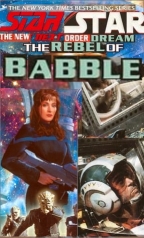 |
|
You can skip this book when you're skimming through the science fiction section of the bookstore; these days they're often conveniently filed away fromt he "real" books. |
Every reader is forced to confront the effects of genre classification. Sometimes, it makes finding good reading harder. Sometimes, it makes finding good reading easier. In bookstores where books are not categorized beyond fiction and non-fiction, finding a decent book can be bit difficult unless you know what you want in advance. That's why you read reviews. But if you enjoy looking for books, then sometimes genre limits and classifications can make the experience more enjoyable. In one part of the store, you can skim past all the 'Star *' books. In another, you can skim past all the '*Vampire*' books. If you're a guy, and the store is so divided, you can bypass the romance section.
On the other hand, having all the books mixed together by expert booksellers can be an enjoyable experience in itself. The booksense.com website offers the opinions of many independent booksellers, and pointers to smaller-press books that might not get coverage from more popular websites. For my money, the king of this mixing is Mark. V. Ziesing. His catalogue combines a vast variety of books, from cutting edge literary work to sleazy sex to vicious vampires, with a slight emphasis on genre fiction. He gives you a frank opinion if he's read the book or the opinions of his other customers if not. There's a personal feeling to each catalogue. In every catalogue, even experienced book seekers will find something they've not seen before. There's an excellent balance of quantity and quality. He backs this up with a good phone rap and a web site that duplicates much of the feel of his catalogue. The catalogue is always alphabetical, by author, all genres and styles mixed in. Via the web site, you can categorize and classify, but it's not nearly as satisfying as going through the print catalogue with a hot cup of coffee and your favorite pen. For the compulsive book buyer, it's a must buy -- made better because as long as you're buying books, the catalogue is free.
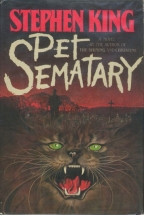 |
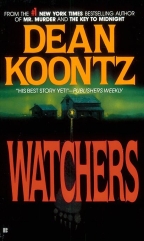 |
|
Many budding writers saw this novel as a roadmap to success -- and so did their publishers. |
Here's a universally loved novel that too many other writers tried to imitate in the 1980s. Nobody got that the appeal was in the originality, not the specific content. |
Writers are forced to confront genre classification as well. Sometimes, it makes it easier to get good fiction published; and sometimes it makes it easier to get bad fiction published. Part of the reason that it's so popular to pronounce the death of horror is that it was absurdly easy to get bad horror published in the 1980's. The paperback publishing industry had a seemingly endless appetite for novels that followed a plot formula roughly laid out by Stephen King in, say 'Pet Semetery', or Dean R. Koontz in 'Watchers'. Add foil, then holograms to the covers to extend the life of the absurdity. Have writers praise one another's work on alternating book covers. (They called that logrolling.) Throw in a few absolute gems hidden amidst the landslide of titles. You've got the 80's horror boom.
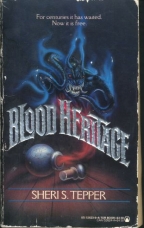 |
|
The secret novel of Sherri S. Tepper, now a highly regarded science fiction writer. He she tried on Stephen King's writing style and churned out a pretty good TV-movie-style novel. |
Respected writers got their start then as well. I just went out to the garage and dug out my Sherri S. Tepper horror paperback for your perusal. Yes, this rightfully acclaimed science fiction writer profited from the horror boom. The novels (there are two in a rough series) are actually pretty good in a made-for-TV-movie fashion. But they were part of a tide that dried up faster than employer's contributions to Silicon Valley 401K plans. And when all that money went out of the publishing industry, a lot of writers got very grumpy. More than a few of the fallen proclaimed that horror was dead.
The latest reason for the death of horror is apparently a glut of horror on the Internet. This has lead to a lowering of standards, and bad writing abounds. Bad writers praise one another's bad writing in bad reviews. Sound familiar? All they need are foil-covered home pages. Or holograms.
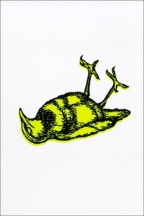 |
|
The bird is dead, but horror lives on in Chuck Palahniuk's 'Lullaby'. |
However, the horror, science fiction and mystery genres will all survive as long as competent writers use their tools. How can anyone possibly think that horror is getting worse when the latest novel by Chuck Palahniuk, 'Lullaby', is horror in every way, shape or form except marketing? It's also a fantastic book. Palahniuk completely disconnects his novel from the traditions while using all the tools: the death spell, the witch, and the haunted houses, the Book of Shadows. But there is no cuddly family that comes together and learns to love one another in the face of a supernatural threat. Instead, there's an assortment of repellant and distanced loners who find themselves caged in a locked-down jailhouse of language. Palahniuk's novel begs to be read aloud. It speaks directly to the readers, and tells the readers things they need to know but would like to forget. 'Lullaby' throws ideas at the reader like a marital artist throwing punches. They rattle around in Palahniuk's cage and rattle around in the reader's brain. It's an exhilarating, exciting experience. 'Lullaby' is a novel that can be easily read and re-read. Try to stop yourself from reading parts to your friends over the phone. Really. They want to experience the language first-hand, you know this as you read the novel.
This is the kind of quality that can't be dragged down by Internet communities. Genre is a Platonic Ideal if ever there was one, and though it can be run through the sewer, it can simultaneously be used to paint pictures in language of incomparable power and quality. Every time someone tells you that a genre is dead or dying, just look to your independent bookseller for evidence to the contrary. Or look for horror novels in the science fiction section. Or general literature in horror. Look for science fiction in the non-fiction section of the bookstore. There are lots of titles that will grab the average science fiction reader. Readers are pretty good at finding what they like, no matter what genre it's classified under. Publishers, bookstores and critics can also help readers make the connection. Whatever it is that you like out there, it's not dying or dead. There's just one real problem with finding good fiction in any genre. It will always be in the minority.
Thanks,
Rick Kleffel